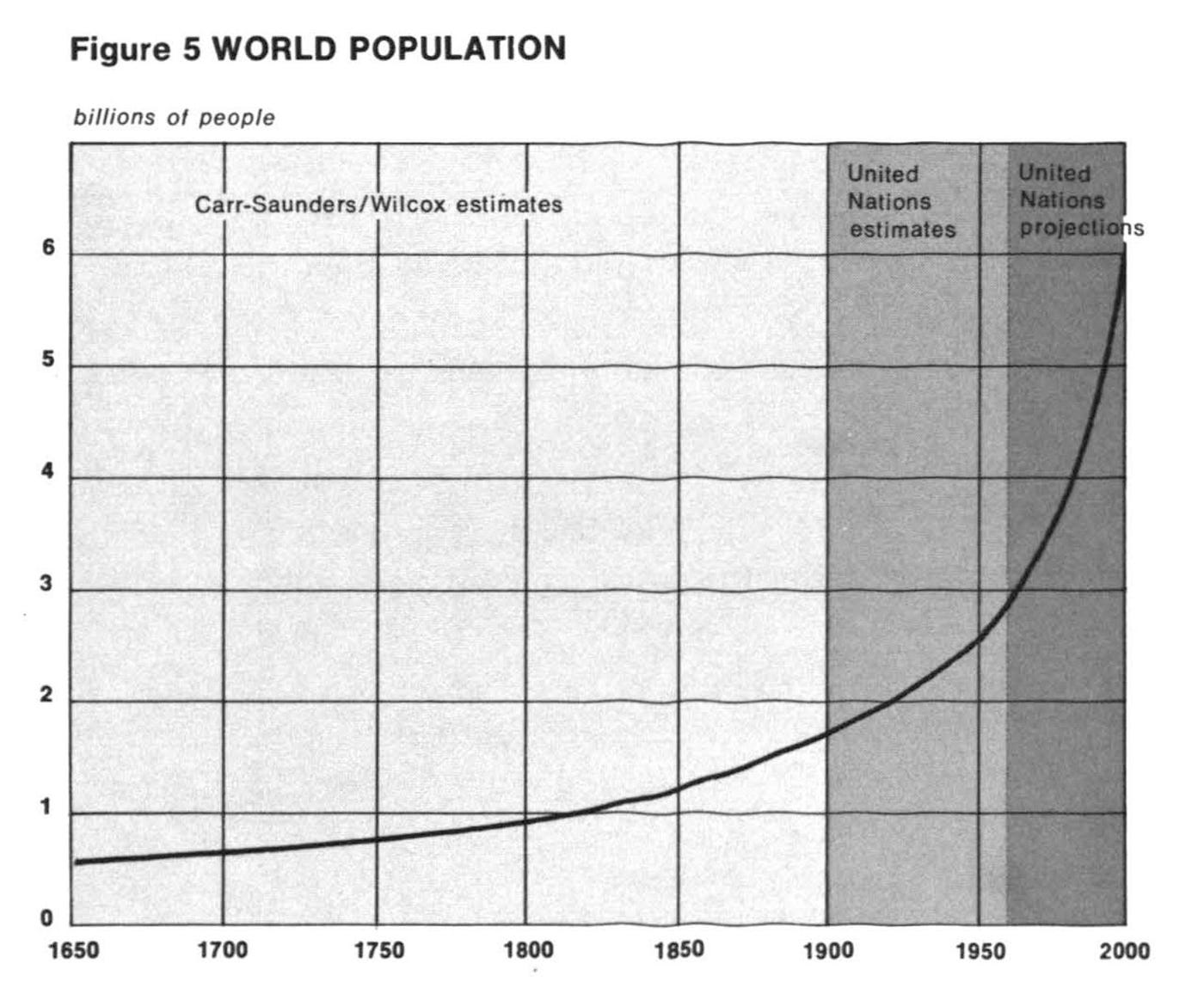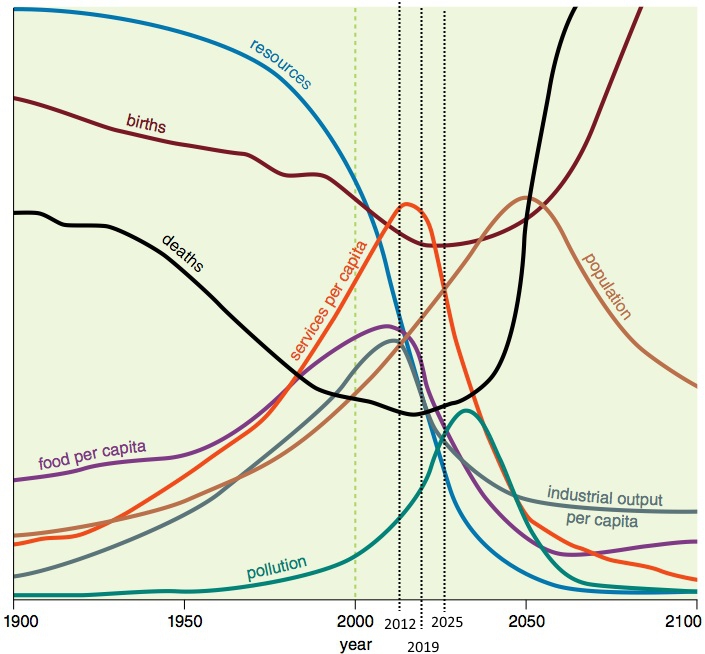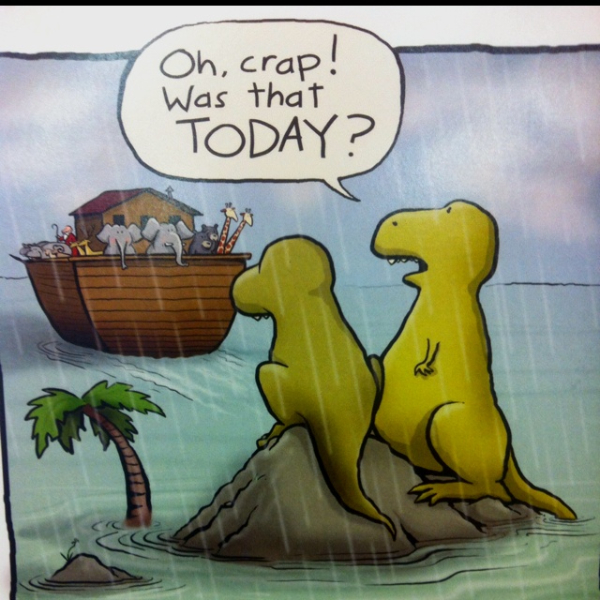As Renaee Churches writes on Medium, it’s too late to ‘fight’ climate change (itself an oxymoron). Climate change is just one of many exponential problems caused by exponential growth, and you simply don’t have much time before exponential processes get out of control. And that time has simply gone. We have had warnings for hundreds of years, for decades, and what we’re seeing now are not warnings, they are the cascading effects already begun.
Humanity and our greed incarnate, corporations, never stopped hitting the gas, we never reduced artificial growth, and never stopped polluting. As Malcolm X said, “You don’t stick a knife in a man’s back nine inches and then pull it out six inches and say you’re making progress.” It’s even worse than what Brother Malik said, because all we’ve done is stick the knife in another nine inches, put a bamboo handle on it, and call it renewable.
As I’ve said before, ‘we’ are not even the operant species, during the colonial era some dickheads programmed corporations with the imperative to keep growing — taking slaves and land wherever it went — and now this legally recognized AI has gotten predictably out of control and devoured the world. We’re at the tail end of this process that devoured countries like mine centuries ago, and the people that pollute the most are trying to bargain now that it’s come for them too. It’s too little too late. We had ethics homework due 400 years ago and failed that, then physics homework due 50 years ago and failed that, and there’s no extensions no more. People say this is ‘defeatism’ but it’s not defeatism if you actually lose.
As Renaee Churches says:
We have already lost the climate battle and it is stories or opinions like [Rebecca Solnit’s], that are preventing others from grasping this, and stopping us from taking the kinds of collective adaptive responses appropriate on a local and global scale.
The not-too-late framing is a dangerous one. It means people are prepared to wait for global elites to roll out the energy transition, to deploy such ‘solutions’ as carbon capture technologies, or other flawed techno fixes, aimed at making those elites wealthy, while not stopping the baked in warming that is already here and accelerating. It is only when we finally break through the not-too-late taboo that we will begin the work in earnest of adaptation to reduce suffering as much as we can.
Somehow we struggle to understand at scale what happens in our own lives every day. Sometimes you are just too late. You miss the train, you lose the girl/boy, someone dies and you can only visit the grave. In more mundane ways, the cake gets burnt, you miss a deadline, hell, the tea gets cold. Entropy’s a one-way street and we’re whizzing down it every day. We all know this on a personal level. It shouldn’t be so hard to understand in the aggregate, and yet hope springs eternal.
What’s different with climate change is that it’s an exponential process, which is legitimately hard to understand. We just don’t understand exponential processes because we rarely encounter them — walls don’t start speeding up as you get closer to them — but we have encountered them recently, which should give you clue as to how fucked we are.
COVID-19 was an example of exponential growth, where something tiny (a few dozen cases) suddenly became huge overnight. While China and many of its neighbors and even small African and Caribbean countries responded quickly and firmly (which is what you have to do with exponential threats), the White Empire under America responded with denial, blame, bargaining, value-signalling bullshit, profiteering, and then back to denial again. They offered too little too late and got swamped with that exponential growth, which was really just a dress rehearsal for climate collapse.
Even if we had gotten the message from COVID-19, it would still be too late. When something is doubling, you can go from half fucked to completely fucked in one cycle, and our civilization has been doubling (in wastes and tastes) every 35 or so years. By 2020, the problem was so far gone that we would have had to stay locked down, that’s the scale of sacrifice required, and nobody’s even considering that. The time to act was at best two or three doublings ago. It’s simply far too late now. We’re just fucked.
And it’s not like we weren’t told.
400 Years Ago
I could go back to the Axial Age 2,500 years ago, but to be specific I’ll go back to the first corporations (what I call a species of artificial intelligence). The first joint stock companies were formed in the 1600s and they were programmed to grow at all costs by raping the world. What were these Golems unleashed on? The entire Global South, which was devoured for natural resources and slaves, using renewable energy at first, in case you thought that was the problem. This was the beginning of exponential growth that should have been nipped in the bud then if we were to have a real chance. While indigenous people resisted (and were also divided and conquered), there was also resistance from within the seat of White Empire at the time, England.
When the South Sea Bubble burst in 1720 (during a plague, cause the gods do try to tell us):
The directors of the South Sea Company were called before Parliament, where they were fined, and some of them jailed, for “notorious fraud and breach of trust.” Though one parliamentarian demanded they be sewn up in sacks, along with snakes and monies, and then drowned, they were, for the most part, spared harsh punishment. As for the corporation itself, in 1720 Parliament passed the Bubble Act, which made it a criminal offense to create a company “presuming to be a corporate body,” and to issue “transferable stocks without legal authority. (The Corporation, Joel Bakan)
Corporations were effectively banned after that collapse of stock-jobbery, but the act had loopholes you could sail a slave-ship through. Still admirable compared to today, when the idea of banning or even slightly reigning in corporations is unthinkable. The programmatic wickedness and irresponsibility of limited liability companies was hotly debated once, not the least by the people in their mouth. Now we’re just left with the consequences and it’s just hot. Now corporations are running the place and we’re mere bystanders, ruled by AI without even knowing it.
Now the colonial chickens have come home to roost, and the planet devouring programs have, quite predictably, devoured the planet. Left unchecked, exponential growth on a finite planet can have only one result. The resources run out, the petri dish overflows with waste, things fall apart. So here we are.
Now, I understand that this is a novel argument, so please understand that 400 years ago was not the only warning. If you insist on following the vainglorious science that got us into this predicament, a book called the Limits Of Growth put the ethical failings of colonial-capitalism into scientific terms 50 years ago.

Figure 5 (see below): “World population since 1650 has been growing exponentially at an increasing rate. Estimated population In 1970 is already slightly higher than the projection illustrated here (which was made in 1958). The present world population growth rate is about 2.1 percent per year, corresponding to a doubling time of 33 years. SOURCE: Donald J. Bogue, Principles of Demography (New York: John Wiley and Sons, 1969 .
50 Years Ago
50 years ago, in 1972 the Limits To Growth was published. It described how the doubling time of our wastes and tastes was dramatically speeding up, and how we were completely fucked if we didn’t act soon. They wrote:
The exponential growth curve of world population is shown in figure 5. In 1650 the population numbered about 0.5 billion, and it was growing at a rate of approximately 0.3 percent per year. That corresponds to a doubling time of nearly 250 years. In 1970 the population totaled 3.6 billion and the rate of growth was 2.1 percent per year. The doubling time at this growth rate is 33 years. Thus, not only has the population been growing exponentially, but the rate of growth has also been growing. We might say that population growth has been “super”- exponential; the population curve is rising even faster than it would if growth were strictly exponential.
The Club Of Rome (the joint authors of the book) did mathematical projections of future growth and resource use and concluded that:
If the present growth trends in world population, industrialization, pollution, food production, and resource depletion continue unchanged, the limits to growth on this planet will be reached sometime within the next one hundred years. The most probable result will be a rather sudden and uncontrollable decline in both population and industrial capacity.
I have bolded the whole thing because, hot damn, they said it and we’re in it right now. The Club Of Rome plotted out predications (which were meant to be taken as trend lines, not specific years) which nonetheless have — as a 2009 follow up in American Scientist notesAmerican Scientist 2009 follow up in American Scientist notes — proved remarkable accurate. As those authors (Hall and Day) wrote:
Although we do not necessarily advocate that the existing structure of the limits-to-growth model is adequate for the task to which it is put, it is important to recognize that its predictions have not been invalidated and in fact seem quite on target. We are not aware of any model made by economists that is as accurate over such a long time span.
Despite how prescient Limits Of Growth was, and how sadly relevant it still is. you can barely find a copy these days. I can’t even find an epub of the book, just a digital scan. Meanwhile the old colonial scammers still have the run of the land, moving onto their latest scam, which is ‘green’ growth, as if painting your tumor a different color makes a difference. The Club Of Rome wrote the Limits Of Growth still in the time of ‘fucking around’, but now we are solidly in the time of ‘finding out’. And what did they predict for now? Well, have a look (either outside or at the chart). It’s not good.

Figure 7. The original projections of the limits-to-growth model examined the relation of a growing population to resources and pollution, but did not include a timescale between 1900 and 2100. If a halfway mark of 2000 is added, the projections up to the current time are largely accurate, although the future will tell about the wild oscillations predicted for upcoming years. (via)
This is a reformatted version of the Limits Of Growth graph. The original authors did not include date markers (besides 1900 and 2100) on purpose, however, as the American Scientists authors say, this model ended up being more numerically accurate than anything made by vulgar economists, who can’t predict shit and keep failing upwards. And ooh boy is a crash coming, crashing straight through imaginary economics into science and straight through to the real world.
As you can see, it’s way too late to do anything now. Hell, it was nearing too late at the time The Limits Of Growth was published. Even that was a last chance, which got buried in a haze of 1980s oil drilling and cocaine. As the Secretary General of the UN, U Thant, said in 1969:
I do not wish to seem overdramatic, but I can only conclude from the information that is available to me as Secretary-General, that the Members of the United Nations have perhaps ten years left in which to subordinate their ancient quarrels and launch a global partnership to curb the arms race, to improve the human environment, to defuse the population explosion, and to supply the required momentum to development efforts. If such a global partnership Is not forged within the next decade, then I very much fear that the problems I have mentioned will have reached such staggering proportions that they will be beyond our capacity to control.
None of the stuff U-Thant was calling for happened and so, as warned, ‘the problems mentioned have reached such staggering proportions that they are beyond our capacity to control.’ Warnings from the past are the epitaphs of the future, which is why it’s so chilling to read them now. Ten years after U-Thant’s warning, the globe did seemingly crash — with the oil crisis — but the response to that was to drill more oil, continue quarrelling, and desperately double down on the doubling that was leading us straight to our doom. And so here we are nearly two doubling cycles later, completely screwed.
Today
What we call ‘warning signs’ today are mislabelled. Getting a climate warning today is like seeing a STOP sign on your windshield, as you crash through it. Correct I guess, but helpful, no. We are in no position to stop, delay, or even meaningfully slow down what’s happening.
People say this is defeatism and, yeah, sometimes you’re just defeated. What’s more intelligent, continuing to waste resources and die in a lost cause, or surrender and recover what you can, saving as many lives as possible? Instead people are being sold the false hope that some magical technology will solve the problems of technology, so keep buying! Their answer to crashing through stop signs is to put a TV in the car, make it self-driving, and telling the people to relax and enjoy themselves. It’s bullshit.
No amount of optimism and motivation can turn back time or reverse entropy. We all know this from our personal lives, we should know it from COVID, why do we miss the point on climate? I understand not wanting to lose, but denial isn’t the same thing as winning. Sometimes you just lose.
People say that admitting defeat means no one will be motivated to do anything. But this is what people are doing anyways! In fact, the false hope continues the degradation and fucking decadence even more. People really think they can ‘solve’ this problem by buying the right shoes or solar panels or magical carbon credits. Nevermind that all ‘renewable’ energy is produced with fossil fuels, and that the resources it consumes are not renewable (certainly not at the scale we propose using them). At this point, we should be marshalling our resources for the undignified crash we’re heading to, not putting fucking TV screens in electric cars. Yet here we are. As Renaee writes:
The obsession with Net Zero is, ironically, also wasting huge amounts of precious remaining fossil fuels that we will need for climate adaptation; to respond to natural disasters, to save crops, to move entire communities, to accommodate refugees.
The energy intensive mining to procure precious earth metals for renewable technologies is destroying remaining habitat for wildlife and Indigenous Peoples in many places around the globe. It is the last desperate grasp for wealth and power by global elites that don’t care about our survival or the Earth and its creatures, they just want to retain their wealth and power above all else for as long as possible — this is their ticket to do it, greenwashing is the norm.
The sad fact is that, in a lot of wars (especially World War II), most people are killed after the war has (historically speaking) been lost. The Germans effectively lost after Stalingrad and were retreating ever since, but they lost the most casualties after that. As Big Serge writes:
The inevitability of German defeat was certainly a reality, but the war was anything but over. In fact, 1944 and 1945 formed the bloodiest and most cataclysmic years of the war by far. The Wehrmacht was losing the war, to be sure, but it still maintained millions of men in the field, and it increasingly propped itself up by mobilizing volunteers from around Europe. In its dying death rage, as it vainly protested its own Götterdämmerung, the Wehrmacht would both kill and die in astonishing numbers.
By November 1943, after over 1500 days of war, total Wehrmacht permanent casualties (dead, disabled, or missing) amounted to roughly 3 million men. This makes for a loss rate of just under 2,000 men per day for over four years.
From November 1943 through the end of the war in May 1945 — a span of 527 days — Wehrmacht losses would be some 5 million men. Thus, over the final eighteen months of the war, German losses were an astonishing 9,400 per day, and although this closing phase made up only a quarter of the war in chronological terms, it accounted for nearly two-thirds of Germany’s total combat losses.
Hitler didn’t subscribe to defeatism, but what did that get the Germans? Even more dead than they would be otherwise, and their lands completely decimated. Given that we’re fighting a fucking force of nature, admitting defeat and surrendering the whole warlike metaphor is the best result we can hope for.
Shit, What Do I Do
At this point people often ask me ‘what should I do?’ and I’m sorry but I don’t fucking know. There are no good outcomes here, just bad and worse. Nor is there one answer for everyone in the world.
My own country (Sri Lanka) has already fallen apart. I already know what it’s like to go without fossil fuels, without electricity, and what it’s like to see the rich throw the poor under the bus so they can party some more. What do you want me to tell you? Grow vegetables, dig a well, try and raise decent children, get right with the gods? There is no right answer and there’s certainly not one right answer for everyone. You’re better off asking your neighbors and seeing how you can help them, not asking how you can help yourself.
Accepting defeat (whatever that means, against nature) is not an end to discussion, it’s a start. It’s the start of a process of grieving, which is different for everyone. One thing I can tell you is that people in the Dirty South, where I’m from, don’t even talk about climate change that much. We’re already fucked and future fucked is really a luxury good. As Vijay Prasad says:
The climate justice movement is a movement that says, “We’re worried about our future.” But what future are we talking about? What future do children in the African continent, in Asia, in Latin America have? They don’t have a future; they don’t even have a present. They’re not worried about the future; they’re worried about their present. Your slogan is, “We’re worried about the future.” But again, what future?
That slogan sounds like a middle-class bourgeois Western sentiment. It’s important to shift our focus to the present. Consider this: 2.7 billion people can’t eat right now, and yet the message is to reduce consumption. How does this message resonate with a child who hasn’t eaten in days? It’s crucial to gain awareness of this reality.
This movement needs to recognize these disparities. Otherwise, it won’t gain traction in the third world where people are struggling for their immediate survival. We must acknowledge the urgent issues faced by those who are most vulnerable.
In my country, Sri Lanka, we ran out of fossil fuels for months and are now under a completely unelected President and IMF administration, starving our children and stripping our healthcare to just load us with more debt and make the stock market go up for one last stock-jobbing swindle. Our children are getting protein maybe once a week. They’re not preoccupied with their future slipping away when the present is already gone.
I don’t know what you do with this information. I think it’s a particular quirk of western democracies that people think they’re in control of all of these global things — that they need to have the right opinions about everything — when in fact they’re just subject to the most unrelenting propaganda which they are unrelentingly obnoxious about.
People are told that they can fight ‘climate change’ by buying the right products and having the right thoughts and they’re missing the point that we’ve already lost. As Carole King said, it’s too late baby, it’s too late. This might lead to grief and rage and gathering your meagre possessions together, as losers of wars (even metaphorical ones) traditionally do. But nobody wants that, they want to keep getting more but different possessions, to have their climate and eat it too. This is actually the spirit that needs to be defeated — this spirit of ‘beating’ nature, the rank defiance of old gods and new. The gods demand sacrifice and they won’t be pawned off with paper straws. The die is cast, the game is lost, all that’s left is the cost. If that’s defeatism, so be it. The battle is lost. All you have is your vanities to lose now.






